US markets are bracing for an extremely painful phase of stock sell-off as continued rate hikes by the Federal Reserve in the months to come are all but a certainty. On Wednesday, the Dow Jones Industrial average plunged more than 1164 points, or 3.6 percent. The drop was the steepest the Dow fell since 2020. Meanwhile, the broader S&P 500 index fell 4 percent and the Nasdaq Composite index dropped 4.7 percent.
According to Guggenheim Partners Global Chief Investment Officer Scott Minerd, the real blow to stock market investors is yet to come. Minerd told MarketWatch that He won't be surprised if the Nasdaq Composite Index plunges 75 percent from its peak through the course of the summer and the S&P 500 falls 45 percent from its peak.

"That looks a lot like the collapse of the internet bubble," Minerd said. A pretty severe selloff is bound to happen as the Federal Reserve appears to have 'very little concern' about the continuation of the bear market, he added.
Across the board, analysts believe that with the Fed committed to keep raising rates to combat inflation, it will be hard to prevent the economy from slipping into a recesstion.
Last week, Goldman Sachs chairman said there was a 35 percent chance of the US economy falling into recession. With the US Federal Reserve rolling out multiple interest rate hikes this year, the economy could slip into recession, analysts at the bank had warned. The odds of the US economy contracting is at about 35 percent over the next two years, Goldman chief economist Jan Hatzius.

"With the passage of time as the Fed continues to hike, we will find ourselves experiencing the effects of increasingly restrictive monetary policy. Well before it reaches this terminal rate the Fed will increase the risk of overshooting, causing a financial accident, and starting a recession," Minerd added.
The Federal Reserve has continued to hold on to extremely hawkish monetary policy. On Tuesday, Fed Chairman Jerome Powell said the central bank will keep raising rates until he finds clear and convincing evidence that inflation is retreating.

Retailer stocks like Walmart and Target were particularly hammered as investors fear that corporate profits will plunge on account of rising prices and muted economic growth. Technology stocks also suffered even as there are rising fears that the lockdown in China will have long-term ripple effects on global economic growth.
The Fed raised interest rates in March as the economy was emerging from the loose monetary policy triggered by the coronavirus pandemic. The quarter-percentage-point rate increase in March was expected to be followed up with more hikes as the Fed is doing a tightrope walk trying to rein in inflation without causing widespread pain in the economy.








